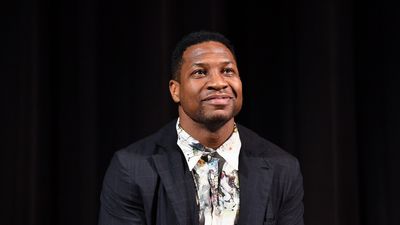What Happens When Your Magazine Cover isn't Manly Enough?
The polarizing reactions to Jonathan Majors' Ebony spread and ASAP Rocky's Vogue cover show how limiting the fear of femininity can be for Black men.
Ebony Magazine released a cover to defeat all covers earlier this month. Jonathan Majors, as chiseled a body and performer as we have, posed over a floral backdrop. His entire physique, inborn confidence, and elegant austerity were a literal flex. He cites Allen Iverson as his inspiration, a fearless expressionist who remade what color and light athletes could show. Jonathan Majors has reached a career peak, rangily playing villains and heroes with gravitas and aplomb. His stature as a thoughtful sex symbol puts him in a cherished lineage of Denzels and Sidneys, and launches him into Hollywood’s A-List strata.
However promising his image might be to young performers, a groaning contingent wants to stop his glow-up. The pink background, the knee-high boots, and, unfortunately, Majors’ vulnerable affect, caused an uproar when the cover was revealed, offending critics online, including prominent ones like Boyce Watkins and Tariq Nasheed. (To Majors' credit, he doesn't seem too pressed about the backlash.)
Their empathy-bereft premise: They want him to be manlier. They need him to look stronger. They need him to disconnect from self to please them. That old complaint is trite and holds Black men back. But it’s so entrenched, Jonathan Majors becomes the conversation in all the wrong ways. A week after the Ebony spread was released, a Vogue cover featuring A$AP Rocky, Rihanna, and their infant extended this meme, with claims — like Nasheed’s — that Black men are in dire jeopardy of losing our power by showing any hint of nurturing or deference.
The current enduring messages about how to be masculine only confuse and oversimplify our social roles. We must discard these arbitrary gender restraints to readily and universally acknowledge our authentic selves. When I was a junior in high school, just coming into my height and the curvature of adult muscles, I could never find jeans. There is no more turbulent ground for the troubled gender norm than how a Black man wears his pants. Whether our sagging them meant we were emulating prison homoerotics or our fitting them meant we didn’t leave enough to the imagination, we’ve always been bound to impossible standards of wear. Leather pants. Denim jeans. Canvas overalls — they determine how we move, how we’re allowed to move, who watches us move, and how we internally police that movement. I went to Burlington Coat Factory before the September rush looking for Guess Jeans in my size and picked the shiny, metallic blue fit with its own matching jacket.
The fear of femininity
When I arrived at school that Monday my boys clowned me. My jeans were "butt-huggers" and they looked "gay." Even then, whatever I did or said was grounds for scrutiny. Reading too much was gay. Talking to female friends was gay. Wearing pink polos, gay.
The fear of femininity pervaded and actually repressed our little teenage crew, constant sentinels of masculinity. It wasn’t until I got older, covering hip-hop styles and trends, that I realized there was often an ongoing war about who was manly enough. Was it 50 Cent, greased up and shirtless on magazine covers signaling coyly at the homothug aesthetic? Was it Cam’ron or Dame Dash, at once style icons from flamboyant Harlem and, simultaneously, downing women and femme gay men every chance they got? It seemed like the only agreed-upon way to uphold this slippery version of masculinity was to bash the feminine qualities in everything. Real or imagined. Thank god by that point I’d started reading Mark Anthony Neal, bell hooks, Joan Morgan, Sistah Souljah and others. The common thread in their theories unraveled the illusion of a precious masculine aesthetic that remained undefinable and still, weirdly, stodgy as fuck.
What the critical voices won’t say about their masculinity is that they don’t know what it is, how to get a handle on it, or how it serves them. In bell hooks’ The Will to Change: Men, Masculinity, and Love, she predicts this cyclical turmoil in men and women forever striving to give gender more power than it already has, writing:
“Wounded men are not often able to say anything positive.”
We have A$AP Rocky relishing his love for his wife and child. Jonathan Major is rejoicing in a long-awaited turn in the spotlight. They’re met with fear and reproach by men who look just like them, who’ve felt some of the same pains.
So in this time where many of us long for loving connection, rescue from plaguing isolation, and celebration of our bodies as symbols we are alive in this moment, we find ourselves dressing still-tender scars from insults past.
The gag is, you were born enough of you, however manly it is or not.
__
Andrew Ricketts is a writer from New York. He wants to tell the story you share with a friend.
